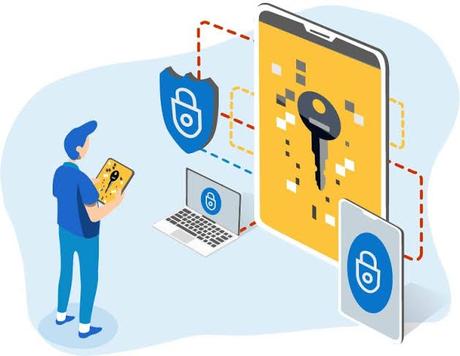Phishing is a sophisticated and frequently effective type of cybercrime used to trick victims into divulging private information like usernames, passwords, and credit card numbers.
Understanding the various attack types and applying best practices are crucial in developing an effective anti-phishing strategy, despite the fact that it can take many different forms, from CEO fraud to email phishing scams.
Workers in particular need to get a solid understanding of phishing attack avoidance because the effects of a successful malicious assault can spread throughout a whole organization.
Phishing Attacks Are On The Rise
The purpose of a phishing attack is to deceive the target into providing sensitive information, such as Social Security numbers or login passwords.
Scammers entice victims to execute the required action by sending them texts, phone calls, emails, or visits to phony websites.
Additionally, they are always coming up with new ways to take advantage of the public's need for trustworthy information.

According to a recent Google report, phishing websites increased by 350% in just two months, from 149,195 in January 2020 to 522,495 in March. The majority of these websites, according to the research, fit the coronavirus (COVID-19) narrative as a ruse.
When global pandemic fears were at their height, phishing attackers targeted these critical targets while using COVID-19-related keywords:
This article examines the many techniques that attackers employ for their online phishing attempts, offering advice on how to prevent them through user education, the use of automated tools like DNS traffic filtering or proxies, and the adoption of sensible incident management procedures.
Also, it goes into great length about web proxies and how to use them as an anti-phishing defense.
What Is Phishing?
Phishing is a complex hoax that is frequently employed by hackers to obtain sensitive data from unwitting victims, such as usernames, passwords, and credit card information.
Attackers pose as trustworthy entities in an effort to trick people into sharing their sensitive data. They frequently resemble well-known companies in appearance.
When successful, these nefarious parties get access to your private accounts and personal information, which they can then sell to third parties for money or use to blackmail you.
6 Major Types Of Phishing 2023
Knowing all the many kinds of phishing attempts that are out there is crucial. Thus, we can defend ourselves if necessary.
1. Email Phishing
Phishing is most frequently done via email when criminals send phony emails that seem to be from reliable sources (such as banks, online merchants, or government organizations) in an effort to dupe recipients into clicking on harmful links or opening malware-filled files.
2. Spear Phishing
In an effort to trick them into disclosing private information, spear phishing assaults target certain people or organizations.
In order to deceive victims into disclosing their passwords, banking information, and other sensitive information, attackers utilize tailored communications and enticements that seem authentic.
When you open the message or download any attached files, the attacker can also install malicious software on your machine.
3. Vishing and Smishing
Attacks like smishing and vishing aim to trick unsuspecting victims into divulging vital information.
Vishing assaults use voice-over IP (VoIP) technology, such as phone calls or text-to-speech programs, to impersonate a reliable source in order to deceive victims into disclosing personal information.
In smishing attacks, the attacker sends SMS messages to the target receiver via mobile devices that contain malicious links that tempt them to click and provide personal information that can be exploited for fraud or identity theft.

4. CEO Fraud
CEO fraud, commonly referred to as "business email compromise" (BEC), is a kind of phishing attack when a perpetrator poses as a senior official, like the CEO or CFO.
The objective is to deceive victims into performing wire transfers, providing money, or giving the impostor access to their personal information.
They frequently use information about the staff and activities of the organization that is readily available to the public to give their attacks a more credible appearance.
5. Angler Phishing
In an angler phishing hack, an attacker sends emails that contain harmful links, malware downloads, or phony websites that appear to be authentic.
The intention is to deceive the victim into disclosing private information, including passwords and financial information.
6. Watering Hole Tactics
A more complex variation of angler phishing is watering hole phishing. In a dangerous attack known as a "watering hole," hackers compromise trustworthy websites so that when consumers visit them, their machines are infected with malware.
Cybercriminals choose well-known websites that they know users frequently visit and insert harmful software code or links to download applications.
Inadvertently providing hackers access to victims' information when they visit these sites can result in infections like ransomware taking over networks or phishing schemes compromising sensitive information.
Now that the context is clear, let's look at how to defend against phishing attack strategies.
How To Prevent Phishing Attacks Through Automated Proxies?
Many strategies can be employed with proxy servers to defend against phishing attempts.
When customers on your network use a proxy server, web traffic is routed via an additional layer of security before reaching the public internet, effectively masking their true identities from hackers and other people trying to gain illegal access.
By establishing a connection behind one of these servers, all requests sent by any user are first routed through this proxy server rather than directly out onto the World Wide Web.
This reduces the exposure risk that individual users face while browsing the internet and helps to provide security against phishing attacks by making it much more difficult for attackers to identify computers connected within certain networks.

Proxies are effective tools for preventing spear phishing attacks.
Furthermore, proxies can help add another layer of encryption and practically operate as a barrier between the computers on your network and any potential outside threats.
These assist in preventing phishing websites that host malware-filled content from ever being loaded onto your device.
Employers can ban harmful websites with proxies while maintaining employee productivity because they hide dubious websites and only permit access to secure ones. This is a great way to prevent automated credential phishing.
Whenever a user receives an email with a link that raises suspicion, they can utilize a secure proxy server to investigate the source before clicking. Proxy servers offer efficient email phishing protection in this way.
In fact, cybersecurity businesses frequently employ proxy servers in their operations.
They are used by cybersecurity professionals to conceal their IP addresses as they monitor internal systems or search the web for exposed corporate data.
This enables them to provide protection services like threat hunting while seeing questionable activities and maintaining their anonymity. Ultimately, the experts themselves are secure even if bad actors hack proxy servers.
In order to obtain insight into the digital threat landscapes, organizations can gather more precise and real-time data via proxies. This allows them to check for vulnerabilities, track assets, and spot misconfigurations more quickly.
Due to the increasing prevalence of cybercrime, it is becoming more and more crucial to be knowledgeable from the beginning.
Professionals can save time and money by using proxies to get over anti-bot protections or geographic restrictions when doing large-scale web scraping initiatives.
Working With Proxy Server Types For Phishing Prevention
For internet privacy and security, proxies are essential. They provide businesses more control over their operations, enable you to access stuff that has been restricted, and conceal your IP address.
Additionally, they assist small to midsize businesses in quickly scraping data while safeguarding servers from dangers like DDoS attacks or criminal crawlers accessing confidential information in HTML parts.
Proxy networks easily broaden the reach of larger enterprises with several workstations throughout the world without increasing infrastructure expenses and degrading performance throughputs.
In conclusion, proxies are important if you're serious about safeguarding sensitive information! It can be difficult to decide which form of proxy to employ, of course.
Although they could be slower than other options, residential proxies are assigned by an internet service provider, making them harder to detect and block than other options.

Residential proxies can help mask a user's identity and location by routing their traffic through an ISP's network, which makes them more difficult to detect and block. As a result, they are an effective automated phishing prevention mechanism.
Residential proxies are less likely to be blocked or blacklisted than data center- or ISP-hosted alternatives because they often have IP addresses from real home connections.
Residential proxies might be slower than other choices, but the anonymity they offer is helpful when attempting to reduce online phishing attacks.
Faster connections are provided via data center proxies, however, they can be more easily identified and route traffic through data centers rather than through houses.
They are more susceptible to blocking than residential solutions since they pass through data centers, making them simpler to detect.
Yet, because the service is provided from a server rather than through home-based networks, they are able to offer quicker speeds.
When fast connection speeds are essential but the risk of being blocked is less crucial, data center solutions might be appropriate.
They can still be beneficial as automated protection against phishing assaults so long as you account for the heightened detection levels when selecting your proxy solution.
ISP proxies offer a compromise between homes and data centers, giving faster speeds than the latter while maintaining a higher level of anonymity than the former.
Users might be able to increase site visit connection speeds with an ISP proxy without risking their privacy.
When choosing your ideal option, it is crucial to consider which characteristics are most crucial because connections may differ by ISP depending on region, just like with other types of proxies.
In the end, this can assist in establishing whether or not using an ISP proxy to guard against phishing attempts makes sense.
However, any threats that breach any proxy services, whether they be data center, residential, or ISP-based, would all offer an extra layer of security for the customer.
While choosing a proxy solution for the best phishing attack defense, you must consider which aspects are most important. When making a decision, there are both technical and business factors.
Some of the most crucial factors for selecting a proxy server when taking into account the technological aspects are as follows:
- The delay in sending or receiving network communications is known as latency.
- The volume of data that may be moved between computers in a given amount of time is known as throughput.
- Specifications for authentication: Who is authorized to access your systems, and how do they do so?
- Encryption needs: Which type of encryption will be needed (e.g. IPsec, SSL), and what level of data security is desired
- LAN and WAN architecture: The types of networks you're using (wired/wireless) to ensure your proxy server can connect with it all.
You should take into account elements like pricing structures and license regulations on the business and commercial side. You might need to consider one-time or subscription fees in addition to any extra expenses related to continuing maintenance.
It's also critical to consider how easily your team can manage enterprise-level configuration modifications - is it simple to install and set up proxy servers across your organization?
Businesses in highly regulated industries, like healthcare, or those working with sensitive data, like finance, must also adhere to appropriate rules and regulations regarding using proxy servers.
You may also like:
